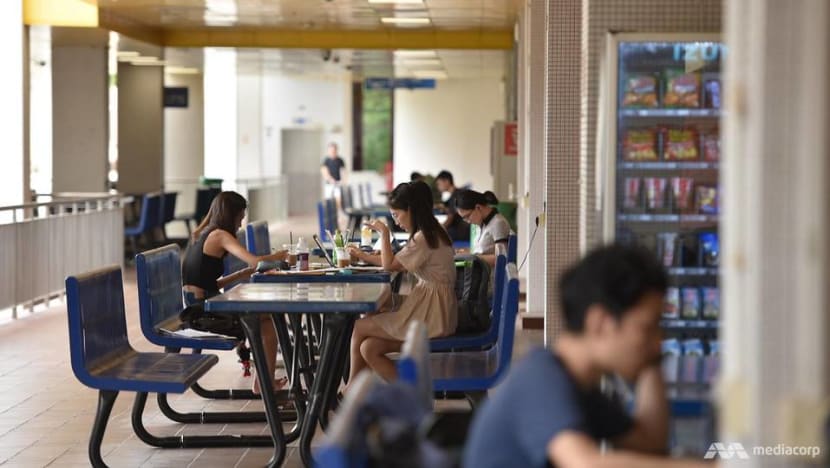Commentary: No university classes on Wednesday afternoons? Thanks, but no thanks

Students sit at a common area in NUS. (File photo: Darius Boey)

This audio is generated by an AI tool.
SINGAPORE: As a new academic year begins for Singapore undergraduates, more attention is being given to issues of student well-being.
University students face a wide range of pressures, especially academic stress. A poll conducted in 2022 by the Inter-University Network, a network of university student unions in Singapore, found that almost 90 per cent of undergraduates said that work and study commitments were their greatest source of stress.
A recent article on Singapore’s internship rat race exposed how intense and exhausting it can be for students to gain desirable career prospects by juggling multiple internship stints with their studies.
Several steps have been taken to combat the stress undergraduates face. Universities have implemented stronger counselling and student support systems, conducted welfare workshops, and scheduled well-being days free of lectures and tutorials.
Another solution being tested is protected time off on Wednesday afternoons. The National University of Singapore (NUS) recently announced its students will be able to take time off from 3pm to 6pm on Wednesdays. This is to encourage “greater participation in out-of-classroom and student life activities” for a more holistic university experience.
However, when I first heard the news as a current undergraduate of NUS, instead of joy, I felt a creeping sense of dread.
IS THE SOLUTION A SHORTER WEEK?
Four-day school weeks have been implemented elsewhere in Singapore. Raffles Institution (RI) began their own four-day school week in 2021, allowing students to take a break on Wednesdays.
In my experience as a former Rafflesian, there are tangible benefits to having a four-day school week.
Free Wednesdays allowed me to devote the morning to one of two weekly co-curricular activity sessions, meaning I spent one less day staying back until the sky grew dark. It also enabled me and my peers to attend enrichment classes on Wednesday afternoons.
Once I had to focus on preparing for preliminary and A-level examinations, Wednesdays became a free day for me to arrange consultations with my tutors as well. Crucially, I did decently for A-levels, along with most of my peers.
JC came with its stresses, but looking back, the fatigue from a long school week never weighed heavily on my mind. Having Wednesdays free gave me a better balance of academics and extracurricular activities, with enough time to unwind and do my own revision in the middle of the week.
PUTTING UNIVERSITY FLEXIBILITY IN JEOPARDY
However, shorter school weeks are incompatible with the flexibility of the university system. Instead of giving undergraduates more time to participate in extracurricular activities, it limits their freedom to organise their schedules, which paradoxically causes even more stress for them.
From primary to pre-university levels, timetabling is a task that falls on the shoulders of teachers. But this is not the case in universities. While lectures have fixed timings, students can choose the courses they take each semester and bid for tutorial slots, allowing them to customise their schedules to fit their preferences.
Each student has their own idea of an ideal schedule. Some of my RI friends liked gap Wednesdays so much they imported it to their NUS schedules. Another friend likes to keep Mondays and Fridays free for her dental appointments.
Blocking out three hours of potential lesson time will mean lessons are more likely to fall on a day that an undergraduate might want to keep clear, forcing them to give up a free day.
Additionally, students have a certain number of course requirements to fulfil, ranging from major-specific courses to general education or interdisciplinary core courses.
However, with a protected time block in place, clashes in lecture and tutorial timing are more likely to happen. While planning out my timetable for the upcoming year, I had to give up three courses due to lecture and tutorial clashes, and my friends had similar experiences. This means undergraduates are less able to customise their university journey.
“RESCHEDULING MISERY”
This isn’t to say that gap Wednesdays will always be incompatible with university scheduling. A few UK universities hold off from scheduling lectures and tutorials on Wednesday afternoons.
However, students in some UK universities may take up to half as many courses compared with undergraduates in Singapore. My friend, who’s studying in Scotland, takes three courses per semester, whereas I take five or six.
Most Singapore universities advise students to take five to six courses each semester for a manageable workload, but students may want to “overload” and take one or two more courses in a semester. This happens especially if they intend to go for a semester exchange programme which do not offer enough courses that fulfil their major requirements.
This increases the amount of pressure undergraduates go through to optimise course selections, something that is more difficult to do with enforced time off.
Because of this pressure to overload on courses, undergraduates will still feel exhausted and stressed by the end of the week. As one friend put it, imposing a break time when undergraduates are still overworked only makes them “reschedule their misery”.
One possible alternative that was suggested by some friends was to shift the protected afternoon to Friday, when students are much more likely to arrange a break. This allows undergraduates to take advantage of the weekend and lets them get some much-needed relaxation after a long school week.
There are no easy solutions in alleviating academic pressure in universities. Besides cutting down on student workload, it seems there are limited options in encouraging a more holistic university life.
While having a protected afternoon off each week might be a step in the right direction, with the current nature of university scheduling, it is not the panacea for student well-being universities might wish them to be.
Alethea Tan is a second-year student at National University of Singapore (NUS).



















